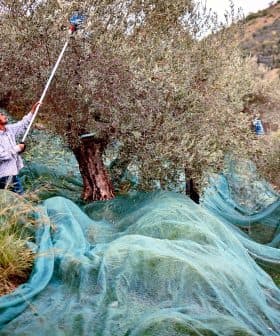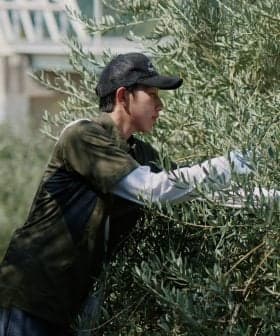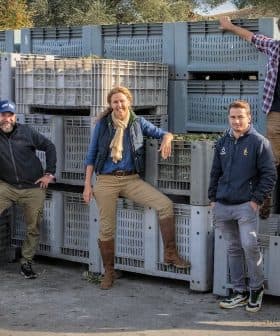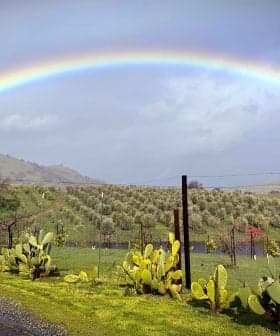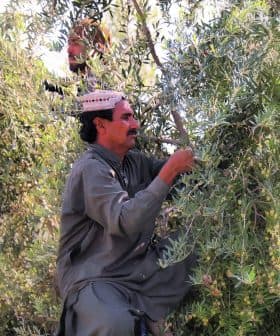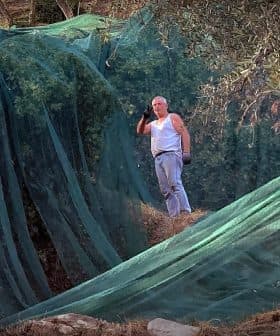EVOO Awards Stir Competitive Spirit in Greece
Greece had a record number of entries at the NYIOOC, but only 21 percent of Greek olive oils won awards, compared to Spain’s 54 percent success rate. Greek producers are now recognizing the importance of organoleptic awards for marketing, with efforts being made to improve quality and compete with Italian and Spanish companies in the global market.
At the recent New York International Olive Oil Competition, Greece set a record for the number of entries by any producing country with 177 submissions, yet Greek olive oils won just 35 awards representing 21 percent of the entries. In contrast, Spain’s success rate was 54 percent. Why was the rate of success so much lower for Greek oils than for other countries?
Overall, 49 percent of the total number of EVOOs submitted to the NYIOOC were rejected as having defects — roughly the same results as in 2014 and 2013. Defects are the red cards in organoleptic judging. You are immediately thrown out of the game.
See Also:NYIOOC Results at a Glance
One might expect Spanish and Italian olive oils to have more defects due to the fruit fly and bad weather that decimated their yields this past season, along with the Xylella fastidiosa disease that has wreaked havoc across Italy and especially in Apulia. But, in fact, Spain won NYIOOC awards with more than half their entries, and Italy was not far behind.
The Italians and Spanish olive oil sectors have long been leaders in organoleptic analysis; they know exactly the taste profiles that are more likely to win. They have conducted extensive research on the best growing, harvesting and milling methods and choose carefully which olive oils to enter in international competitions.
Olive groves in Greece are small, on uneven ground, and not suitable for mass production. They are very bio-diverse with thyme and oregano growing among the olive trees, surrounded by fruit trees and many varieties of wildlife, flowers and wild greens. These are ideal conditions for producing complex taste characteristics and fruitiness.
Yet Greekextra virgin olive oil producers have only recently begun to view organoleptic awards as an integral part of their marketing strategy. This rising interest was further spurred by the economic crisis. Greek producers now recognize the marketing advantage and wide publicity gained by receiving an award from a high-profile competition and the consumer confidence it fosters.
This is important especially for the new breed of Greek olive oil entrepreneurs who appeal to a higher priced premium market. The cost of submitting an olive oil to a competition is a fraction of the cost of other forms of publicity programs to gain recognition in a new market or expand an existing one. Meanwhile, consumers are increasingly looking for proof of quality before paying a higher price.
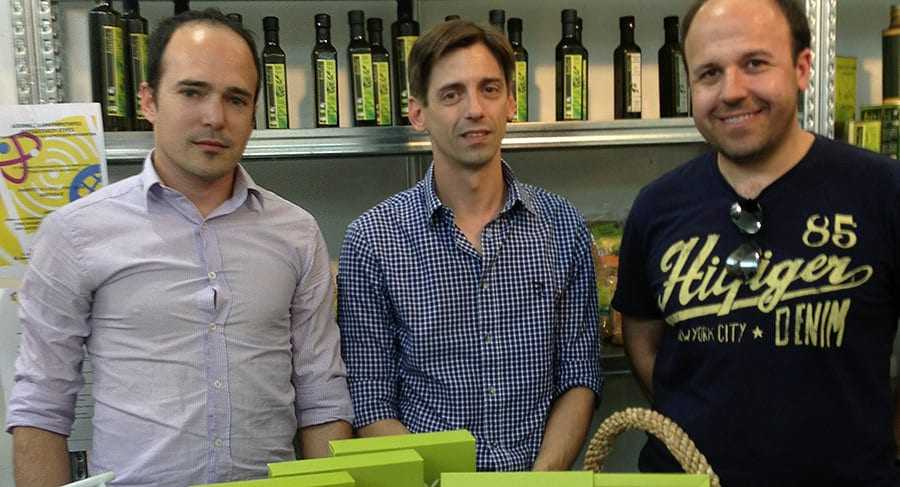
Dimitris Konstantinidis, Angelos Skaltsas and Nikos Skrekas at Elaiotechnia
Dimitris Konstantinidis buys the same oil as the NYIOOC Gold Award-winning Mythocia by Papadopoulos and bottles it under a different brand name, “Olive Live.” He explained the steps in choosing a supplier: “We conduct extensive organoleptic and chemical analysis before we make our choice. We then submit olive oils to an organoleptic panel before making the final decision which ones to purchase. We also examine the olive groves in order to analyze the conditions that produce the best tasting olive oils and work closely with olive growers and mills to ensure a consistent supply of high-quality EVOOs. This is why we have a limited supply and all our bottles are individually numbered.”
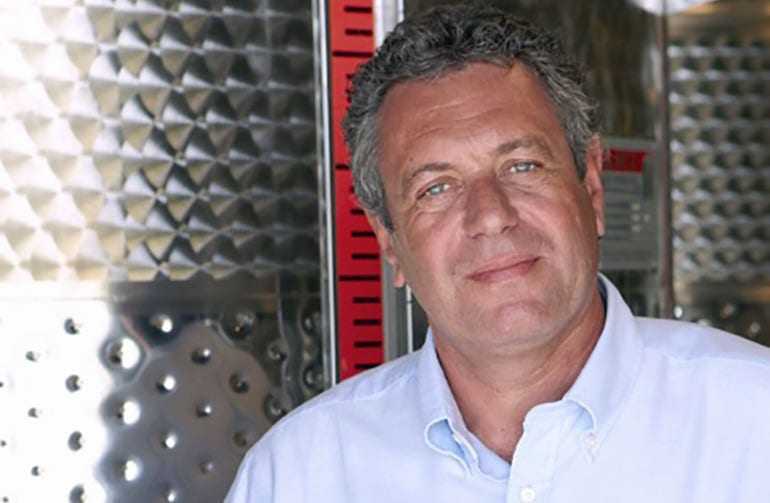
Plilippe Poli
Another Gold Award winner at NYIOOC is Philippos Hellenic Goods. Owner Philippe Poli has trained in organoleptic analysis in order to be able to choose the olive oils himself. He travels extensively seeking out the best olive oils across Greece. “If you want to introduce a new product or increase sales, you’d better be able to prove it is worth every dollar using every means at your disposal.
Being able to taste an olive oil and transport and store it in ideal conditions is the best way to ensure the quality I have the privilege of tasting at the mill is what I deliver to my customers,” Philippos said, as he headed off to supervise the expansion of his state-of-the-art olive oil storage and bottling facility on Aegina Island. His NYIOOC success is already having a positive impact on demand for his recently-launched brand.
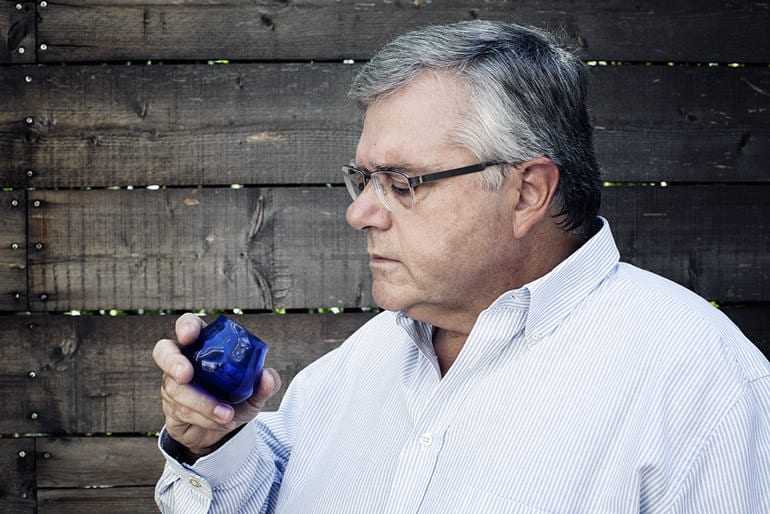
Vasilis Frantzolas
Vasilis Frantzolas is a Greek olive oil consultant, organoleptic judge and educator who also confirmed the necessity of the organoleptic approach with the addition of best grove management practices. He won a Gold Award at the 2015 NYIOOC, the second year in a row, and many more around the world, for his own brand Pelion Olive Farms.
In addition, he is able to claim some credit for training producers and millers in making high-quality olive oils as well in proper grove management practices and organoleptic evaluation. Several producers he has trained won NYIOOC awards with Greek olive oils this year.
Frantzolas conducts regular educational seminars: “We go beyond the organoleptic analysis encompassing the full cycle of producing award-winning olive oils. From the harvest methods to the mode of transportation and proper conditions before milling, the proper washing of the olives, type of crusher, the length of malaxation period and the amount of water used in the centrifuge all play a vital role in producing high quality olive oils with well-balanced organoleptic qualities,” he explained.
“Greek olive oils are mainly from the Koroneiki variety which tends to have low to medium fruitiness usually due to the way it is processed. So, weak fruitiness may be one of the reasons for the low percentage of Greek olive oils being awarded at the NYIOOC this year in relation to the number entries.” Frantzolas went on to explain: “This is being looked at carefully at the production and harvesting cycle, and Koroneiki and other varieties are beginning to win more and more awards so the overall picture will change dramatically in the years to come.”
I also asked Dimitris Gyfteas of Agrovim who produces the Iliada brand about the low percentage of winning olive oils at NYIOOC this year. “This was a difficult year in our area of Kalamata due to the cold weather. The Koroneiki variety is very sensitive to its environment so the early harvest EVOOs have done much better in competitions this year than the late harvest EVOOs due to the frost. Once the fruit freezes it loses some of its more complex taste characteristics and fruitiness favored by the judges.”
Kostas Balafas of Moria Elea, when asked about the value of competitions, had a different perspective: “Winning awards will not open the markets. For example, although Moria Elea brand was among the most awarded brands of Greek extra virgin olive oils in 2013, it did not help the brand to penetrate the U.S. and U.K. markets.”
This came as a surprise, so when I named producers who have reported that winningawards did open new markets for them, Balafas elaborated his point: “It is true you can sell a few thousand bottles of award-winning olive oils in specialty stores, but the key to developing our olive oil industry is to work together and create collective marketing campaigns in order to increase awareness and demand for Greekextra virgin olive oil and gain greater access to shelf space in supermarkets.”
Even if Greek producers offer some of the bestextra virgin olive oil brands, it is very difficult for them to compete with Italian and Spanish companies who have built big distribution and sales networks many years ago and they control the market. Thus, I believe Greek producers have to promote premium Greek extra virgin olive oil, and not just their own brand, more intensively in order for consumers to learn that this Greek product is of exquisite quality.”
Sevitel and Ekepe are keen to do just that. Sevitel, the Hellenic Association of Industries and Processors of Olive Oil have recently received €7.2 million and EKEPE, (Hellenic Center for Exports and Promotion of Olive Oil), have received €4.7 million from the E.U., the Greek government, and from stakeholders, in order to promote Greek extra virgin olive oil and olives in North America, China, Russia, Norway, Australia, Switzerland, Brazil, Albania and Serbia.
Giorgios Economou, director of Sevitel explained: “This money will be used to promote the high quality of Greek olive oil and olives along with their Hellenic cultural history. We want to raise the awareness on the high quality of Greek olive oil internationally in order to assist the Greek brands in their individual marketing campaigns.”
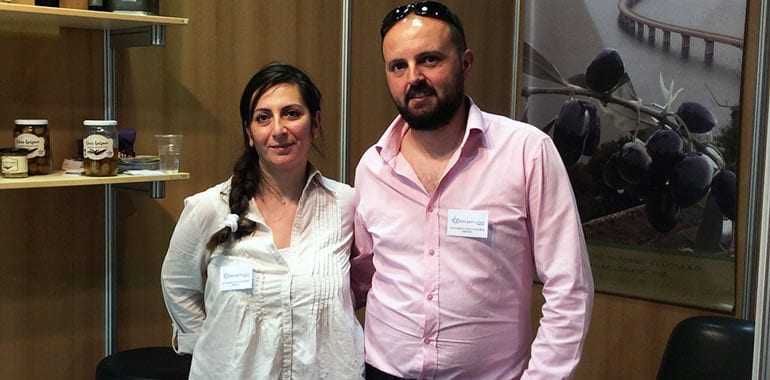
Dimitra Ktenidou and Athanasios Makrigiannis
The province of Kozani in North Western Greece is home to one of the least known olive oil producing areas in Greece. The Imera Olive Oil Cooperative is based in the village of Imeras which means literally “the same day.” Dimitra Ktenidou explained the approach: “We have instituted an organized harvesting program in order to process the olives the same day they are picked,” in their modern equipped olive mill completed in 2006.
They produce only early-harvest olive oil under strict conditions. One of their clients won a Gold Award at NYIOOC and they are keen to enter competitions under their own brand that was recently awarded silver and a bronze medal at Elaiotechnia competition in Athens. They plan to enter more competitions, including the NYIOOC next year.
Their local Member of Parliament, Georgios Kasapidis, has been one of the most vocal supporters for the implementation of the EU labeling regulation 432/2012. I will be reporting on his latest initiatives to break the deadlock in Greece for using this E.U. health claim regulation in my next article.
In conclusion, there is a positive consensus emerging following the NYIOOC, on the value of submitting Greek olive oil brands to organoleptic competitions along with collaborative marketing campaigns. Despite the bleak economic outlook for Greece these days, the future looks bright for those who are prepared to strive for quality. All indicators are pointing to a reawakened competitive spirit in Greece under the canopy of their ancient cultural identity; the olive tree.


